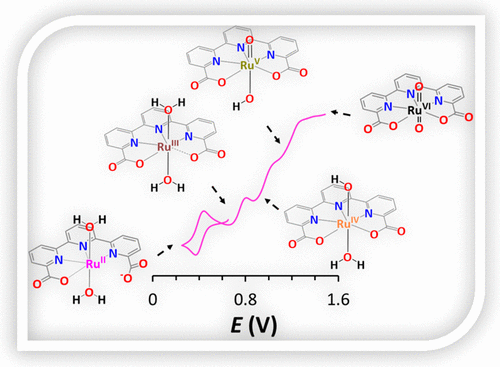In this work we have prepared and characterized two Ru complexes that contain the pentadenatate tda2– ligand (tda2– = [2,2′:6′,2″-terpyridine]-6,6″-dicarboxylate) that occupies the equatorial positions and two monodentate ligands aqua and/or dmso that occupy the axial positons: [trans-RuIII(tda-κ-N3O)(OH2ax)2]+, 3III(OH2)2+, and [RuII(tda-κ-N3O)(dmso)(OH2ax)], 4II. The latter is a useful synthetic intermediate for the preparation of Ru-tda complexes with different axial ligands. The two complexes have been characterized in the solid state by single-crystal XRD and by elemental analysis. In solution, complex 4II has been characterized by NMR spectroscopy as well as the one-electron reduction of complex 3III(OH2)2+. The electrochemical properties of 3III(OH2)2+ and 4II have been assessed by cyclic voltammetry (CV) and differential pulse voltammetry (DPV). Complex 3III(OH2)2+ shows the presence of four redox waves that are assigned to the VI/V, V/IV, IV/III, and III/II redox couples. The variation of the redox potentials is analyzed as a function of pH and is graphically presented as a Pourbaix diagram. Finally, the redox potentials displayed by both 3III(OH2)2+ and 4II are compared to related complexes previously reported in the literature and rationalized on the basis of the electron donating or withdrawing capacity of the auxiliary ligands as well as with regard to their ability to undergo seven-coordination at high oxidation states.
